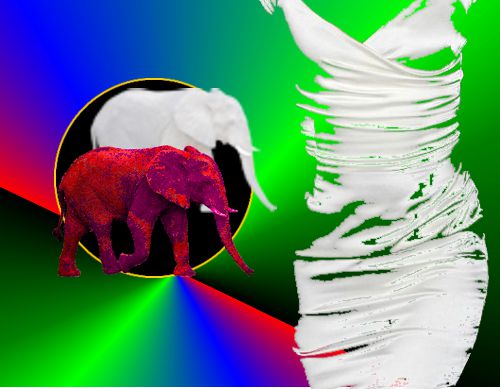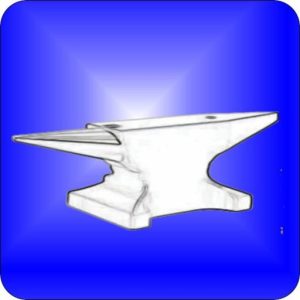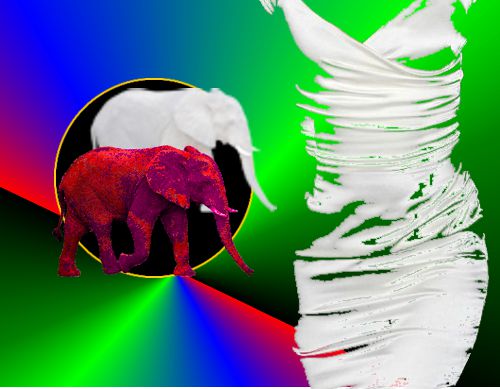<continued…> “That’s what who said? And why’d he say that?”
“That’s what Hawking said, Al. He’s the guy who first applied thermodynamic analysis to black holes. Anyone happen to know the Three Laws of Thermodynamics?”
Vinnie pipes up from his table by the coffee shop door. “You can’t win. You can’t even break even. But you’ll never go broke.”
“Well, that’s one version, Vinnie, but keep in mind all three of those focus on energy. The First Law is Conservation of Energy—no process can create or destroy energy, only transform it, so you can’t come out ahead. The Second Law is really about entropy—”
“Ooo, the elephant!”
“Right, Anne. You usually see the Second Law stated in terms of energy efficiency—no process can convert energy to another form without wasting some of it. No breaking even. But an equivalent statement of that same law is that any process must increase the entropy of the Universe.”
“The elephant always gets bigger.”
“Absolutely. When Bekenstein and Hawking thought about what would happen if a black hole absorbed more matter, worst case another black hole, they realized that the black hole’s surface area had to follow the same ‘Never decrease‘ rule.”
“Oh, that Hawking! Hawking radiation Hawking! The part I didn’t understand, well one of the parts, in that “Black Holes” Wikipedia article! It had to do with entangled particles, didn’t it?”
“Just caught up with us, eh, Jeremy? Yes, Stephen Hawking. He and Jacob Bekenstein found parallels between what we can know about black holes on the one hand and thermodynamic quantities on the other. Surface area and entropy, like we said, and a black hole’s mass acts mathematically like energy in thermodynamics. The correlations were provocative ”
“Mmm, provocative.”
“You like that word, eh, Anne? Physicists knew that Bekenstein and Hawking had a good analogy going, but was there a tight linkage in there somewhere? It seemed doubtful.”
“Nothin’ to count.”
“Wow, Vinnie. You’ve been reading my posts?”
“Sure, and I remember the no-hair thing. If the only things the Universe can know about a black hole are its mass, spin and charge, then there’s nothing to figure probabilities on.”
“Exactly. The logic sequence went, ‘Entropy is proportional to the logarithm of state count, there’s only one state, log(1) equals zero, so the entropy is zero.’ But that breaks the Third Law. Vinnie’s energy-oriented Third Law says that no object can cool to absolute zero temperature. But an equivalent statement is that no object can have zero entropy.”
“So there’s something wrong with black hole theory, huh?”
“Which is where our guys started, Vinnie. Being physicists, they said, ‘Suppose you were to throw an object into a black hole. What would change?’”
“Its mass, for one.”
“For sure, Jeremy. Anything else?”
“It might not change the spin, if you throw right.”
“Spoken like a trained baseball pitcher. Turns out its mass governs pretty much everything about a black hole, including its temperature but not spin or charge. Once you know the mass you can calculate its entropy, diameter, surface area, surface gravity, maximum spin, all of that. Weird, though, you can’t easily calculate its volume or density — spatial distortion gets in the way.”
“So what happens to all those things when the mass increases?”
“As you might expect, they change. What’s interesting is how each of them change and how they’re linked together. Temperature, for instance, is inversely proportional to the mass and vice-versa. Suppose, Jeremy, that you threw two big rocks, both the same size, into a black hole. The first rock is at room temperature and the other’s a really hot one, say at a million degrees. What would each do?”
“The first one adds mass so from what you said it’d drop the temperature. The second one has the same mass, so I don’t see, wait, temperature’s average kinetic energy so the hot rock has more energy than the other one and Einstein says that energy and mass are the same thing so the black hole gets more mass from the hot rock than from the cold one so its temperature goes down … more? Really?”
“Yup. Weird, huh?”
“How’s that work?”
“That’s what they asked.”
~~ Rich Olcott


Black holes, absorbing all light that falls on them, behaves as perfectly absorbing blackbodies, right?
From our knowledge about blackbodies we know that a perfect absorber is also a perfect emitter. I was thinking about this today and realized something. If we were observing a perfect absorber emitting all heat/light absorbed from its surroundings, what would it look like?
I think there is only one possible result. If all heat/light from all directions is absorbed and emitted exactly equal, emission would be an exact opposite flow to the incoming flow from any direction. This means that it cancels out at the horizon. Observing a perfect blackbody in space that emits all energy absorbed from all directions, would be an observation of a body with a surface that cancels all light by exactly equal emission in opposite direction. That sounds pretty much like a black hole. But with a big difference, an exactly equal flow cancelling at the horizon would act like a ball-bearing instead of attracting with a gravitational force.
Since we only assume black hole as real without confirmation from direct observation, it’s all guesses any way. I think it’s weird that the nobel prize was given for detection of gravitational waves from black holes, when we don’t know what gravity is, we don’t know what space is and nobody has ever observed any black hole. It’s like Gandalf would get the prize for proving the effect his imaginary friend has on the heart rate of ghosts, by measuring fluctuations in his aura, with an amplitude smaller than a millionth of the width of a strain of hair. With such observations of practically nothing predicted with assumptions based on imagination about waves propagating in space, which we don’t understand in the first place, I feel like any guess about black holes and gravity is as good as the other.
I think investigating gravity by observing the relationships up close, on earth, would be a better approach than guessing about what we can’t see in places we know nothing about. Using proven principles like thermodynamics provide interesting correlations, like how mean emission of heat at the earth surface, at 287K, equals a surface stress/thermal resistance of 4g². Adding that solar heating and gravitational force is equal in the electric field equation for the inside of a hollow sphere,
TSI/(4/3)=4/3*8g², the connection to heat, charge, potential and opposing forces imply that gravity and heat/light is intimately connected. Which is obvious, considering the first law.
To me, that is far more interesting than Gandalfs aura-fluctuations.
LikeLike
Thanks. You’ve given me several ideas for other posts.
One thought I’d like to leave you with — science isn’t a jumble of disconnected bits and pieces. It used to be that way, back in the 15th and 16th Centuries, but we’ve come to realize that the parts are connected. A good theory connects many parts, as when Newton used his theory of gravity to connect the orbits of planets with how cannon balls (and falling apples) behave here on Earth. Einstein’s theories connect what Newton gave us with a much wider range of phenomena ranging out to the edge of the observable Universe.
LikeLike
You actually make it appear really easy with your presentation but I find this matter to be actually something that I believe I’d by no means understand. It seems too complex and very large for me. I’m taking a look forward to your next submit, I’ll attempt to get the grasp of it!
LikeLike
You’re right, it is complex, but it’s worth the work you’re putting into it. Learning is a spiral process — you go around and around, and each time you come back to a point you understand more about it. Good luck, and enjoy the progress you’re making.
LikeLike
I am not sure where you’re getting your information, however great topic. I must spend a while finding out more or understanding more. Thank you for wonderful info I used to be looking for this info for my mission.
LikeLike
I’m glad you’re enjoying my posts, and I’m also glad you’re being just a little skeptical. My intent is to give you an introduction to the concepts, how to look at them and how they tie together — but it’s only an introduction. Please don’t trust what I write, please do research the keywords, ideas and facts with other sources before you make use of them.
LikeLike
Excellent weblog right here! Also your website loads up fast! What host are you the use of? Can I am getting your associate link in your host? I wish my website loaded up as fast as yours lol
LikeLike
Glad you like it. It’s hosted by WordPress.com. I think part of the speed is the simple design and I keep the graphics (relatively) small.
LikeLike